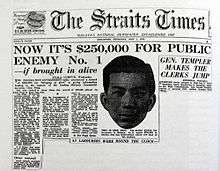Sungai Siput
Sungai Siput is a town and also a parliamentary constituency in Kuala Kangsar district, Perak, Malaysia. Sungai Siput is part of the Majlis Perbandaran Kuala Kangsar. The area covering 155.141 hectares is 61.5% of the total area of Kuala Kangsar. It is located about 25km from state capital, Ipoh and 20km from royal town of Kuala Kangsar. Since the recent Malaysian general election of 8 March 2008, this parliamentary constituency is represented by Dr Jeyakumar Devaraj, from Pakatan Rakyat Party, in the Dewan Rakyat, the lower house of Malaysian Parliament. Dr Michael Jeyakumar Devaraj defeated the previous incumbent, Dato Seri Samy Vellu, who had held the seat since 1974.
Ahamad bin Pakeh Adam from Barisan Nasional is the current state assemblyman for Lintang state seat and from DAP is the current state assemblyman for Jalong state seat. He is also the State Local Government Committee chairman.

Sungai Siput is famous for the incident that led to the Malayan Emergency. The Malayan colonial administration declared a state of emergency on 16 June 1948 after members of the Communist Party of Malaya killed three European plantation managers here. The CPM was subsequently banned in July. Many Singaporean historians and anti-communists allege that Chin Peng ordered the killings. Chin Peng claims he had no prior knowledge. In fact, he says he was so unprepared for the start of hostility that he barely escaped arrest, losing his passport in the process, and lost touch with the party for a couple of days.[1]
Mahatma Gandhi Kalasalai Tamil School is the biggest Tamil school in the state with over 1000 students. The school was built by Tun V. T. Sambanthan in 1954 and was officially opened by Vijaya Lakshmi Pandit, former Indian Prime Minister Jawaharlal Nehru's sister.
Sungai Siput is famous for its groundnuts and can easily be bought in one of the shop along the main street.
Besides, the famous Chinese Esperanto Professor, Mr LI Wei-Lun was born in Sungai Siput in 1936[2]
See also
References
- ↑ Chin Peng, My Side of History, pp 215-222.
- ↑ http://www.espero.com.cn/2013-07/19/content_29470963.htm
Coordinates: 4°49′12″N 101°4′12″E / 4.82000°N 101.07000°E